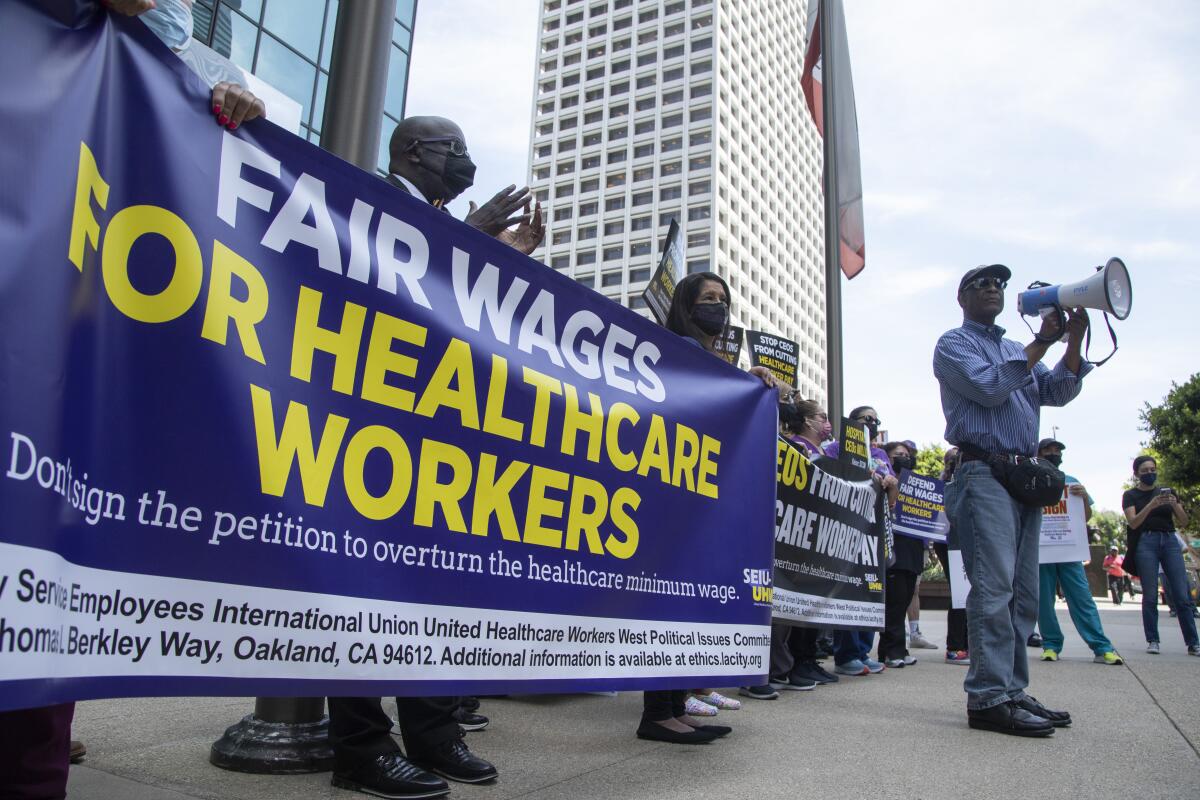Wage boost for Inglewood hospital workers expected to pass; Duarte measure failing

- Share via
Workers at private hospitals and dialysis clinics in Inglewood are poised to get a wage increase, with a measure to boost their minimum wage to $25 an hour remaining ahead as election results continued to be tallied this week.
The wage measure was championed by the healthcare workers’ union Service Employees International Union-United Healthcare Workers West, which has argued that pay increases are crucial to retaining workers who have felt devalued during the COVID-19 pandemic. The union has been hoping that local measures in Los Angeles County cities such as Inglewood could pave the way for a statewide increase in wages.
“We’re thrilled that Inglewood voters recognize and value the sacrifices made by essential healthcare workers,” certified nursing assistant Martha Alvarez said in a statement released by SEIU-UHW on Tuesday. “Raising wages is not only fair, but it will help attract more workers to Inglewood and help patients get the care they need.”
The Inglewood measure, Measure HC, had garnered more than 53% of the vote as of the latest tallies. In Duarte, however, a similar measure backed by SEIU-UHW was faltering, with 63% voting no on Measure J in the results that had been counted as of Tuesday afternoon.
Leaders of the SEIU-UHW healthcare workers union argue that the wage hikes are crucial to retain workers who have felt devalued during the pandemic.
Hospital groups and other opponents argued that the proposed increases would unfairly single out some facilities and not others, creating inequities in the labor market. They also warned that rapidly increasing pay could jeopardize some hospitals. After local officials voted for similar hikes in Los Angeles, Downey and Long Beach, opponents including the California Assn. of Hospitals and Health Systems gathered signatures to force the measures to be put on the ballot instead, putting them on ice until voters can decide.
“Voters recognized the serious flaws in each of these measures with voters in Duarte appearing to overwhelmingly reject Measure J, while Inglewood voters are currently supporting Measure HC by a narrow margin, despite being one of the most progressive cities in the state,” George W. Greene, president of the Hospital Assn. of Southern California, said in a statement.
Greene said that his group supports continued conversations about worker compensation at the state or regional level, but “deeply flawed ordinances considered city-by-city is bad policy and the wrong approach.”
SEIU-UHW pointed instead to spending by their opponents, who had garnered more than $1.2 million for their campaign to combat the Duarte measure by early November, according to campaign filings. The union raised roughly $600,000 to promote the Duarte measure.
The Inglewood and Duarte ballot measures sought to cover a range of employees, including security guards, clerical workers, nursing assistants, aides, housekeepers, groundskeepers and others who work at privately run hospitals, psychiatric facilities, dialysis centers and clinics that are part of private hospitals.
SEIU-UHW had estimated that the two measures would affect nearly 700 of their members, as well as an unknown number of workers who are not part of the union. The Duarte measure would cover workers at the cancer treatment center City of Hope; the Inglewood measure affects those at Centinela Hospital Medical Center and seven dialysis clinics, according to SEIU-UHW.
More to Read
Sign up for Essential California
The most important California stories and recommendations in your inbox every morning.
You may occasionally receive promotional content from the Los Angeles Times.












